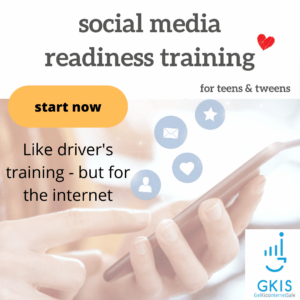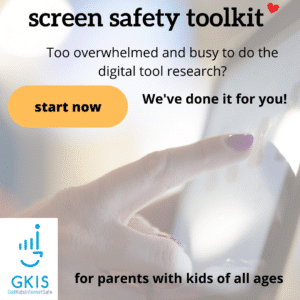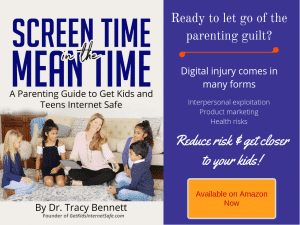
The Internet can bring out the worst in people. Some say millennials have empathy deficits due to screen communications replacing face-to-face experiences. If that’s the case, what about the younger iGen’s who were born with screens in their hands? Are they doomed? Are we destined to turn into robots with poor empathy skills? Today’s article tells us what empathy is, how it’s learned, and how screen use is impacting its development.
What is empathy?
Empathy is the capacity to understand and share another person’s perspective and emotions. It is the sadness you feel when someone you love is in pain or the joy of watching new parents hold their baby for the first time. Empathy is at the heart of human connection and is key to preventing cruel actions against others.
How do we learn it?
Kids learn empathy by watching their parents. We are prewired to learn it with specialized learning cells in the brain, called mirror neurons. Mirror neurons are part of a motor neuron that allows us to move facial muscles when expressing emotions. In Dr. Bennett’s book, Screen Time in the Mean Time: A Parent Guide to Get Kids and Teens Internet Safe, she says:
Our biology sets us up for success. In the 1980s, Giacomo Rizzolatti and his team of Italian researchers discovered that when macaque monkeys observed the behavior of other monkeys, the same neurons in their brains fired as if they themselves were performing the behavior (Pellegrino, 1992). In other words, the monkeys had specialized brain cells (called mirror neurons) ready to fire by observational learning. They learn and get practice by watching as well as doing.
Researchers now have evidence of similar mirror neurons in humans younger than twelve months old and hypothesize that mirror neurons are not only key in learning specific chains of motor behaviors but may also be what’s behind complex emotional learning like empathy and attachment (Falck, 2006). This genetic advantage means we are neurologically prewired to understand the intentions of others and unconsciously respond (Rizzolatti, 2006). We not only recognize logically what others are doing and feeling, but we also experience it with them. We are prewired to mimic, learn, and connect with each other.
Other factors necessary for the learning of empathy include:
- the brain chemical oxytocin that sets us up to bond,
- physical contact and nurture between parent and child,
- parent-child fit,
- warmth,
- consistency, and
- gently guiding communication.
Kids learn empathy better when it is modeled rather than when it is taught in the classroom.[2] They learn by interacting and watching how their parents respond to the cashier at a retail store or the server at a restaurant.
Empathy is also learned from how parents treat their children. If a parent is kind to their child, then the child will learn to be kind. Skilled caregivers reinforce empathic behavior when they provide an ongoing narrative about activities, validate emotion (confirm that they see and understand the child’s emotion), and praise children for prosocial behaviors like sharing and helping. The more practice and positive feedback kids get, the stronger their empathy skills. Of course, some kids are born with a natural talent to develop empathy based on genetics and personality. But with practice, all kids become less and less egocentric and more and more people-centered.

The Importance of Empathy
Teaching empathy is important because empathy helps us build relationships and adapt to stressful situations and setbacks. Doing a job well not only requires technical skills, but it requires empathy also.
In the professional sphere, empathy helps with negotiations, teamwork, interviews, and customer service.
On the playground, empathic children are good at making friends, keeping friends, and making others feel welcomed and cared for. They make the playground a safer place.
How Screen Time Interferes with Child Empathy
With all of us distracted by the cheaper version of connection from screen time, we are getting less practice with true empathy. Some experts believe that the rate at which young people and children express empathy has declined by as much as 25% in the past 10 years. [3]
Another way screen use interferes with empathy is by encouraging self-centeredness. Social media is believed to promote the obsession with self by allowing the user to edit and correct their image to the point of false perfection.[3] With the “perfect” virtual self to live up to, our nonvirtual selves often fall short of expectations. This can cause us to avoid real-life interactions and prefer screen interactions. We are more “connected” than ever with more and more people, yet we are getting more lonely, anxious, and depressed.

Ways Parents Can Promote Child Empathy
Narrate everyday activities while your kids watch and participate.
Make sure you include “feeling” words and challenge the child to imagine how other people might be feeling. For example, “Ooh this dinner is going to be good! It makes me happy to imagine the smiles on everybody’s faces when they take their first bite!”
Take the time to truly engage with eye contact, hugs, kisses, and tickles. Quiet snuggles count too.
Be sensitive to your child’s needs and let them know you “see” what they’re feeling. For example, “Oh honey, I can see you are getting tired and need a little break because you are frowning and rubbing your eyes. Let’s relax now and read a story.”
Set your child up for success by setting up a variety of playdates with all different ages of kids and adults.
Kids learn empathy by being nurtured, but also by nurturing themselves. Taking care of younger kids and following the instruction of older mentors offers various nuances for socioemotional skill-building.
Monkey see, monkey do.
Keep in mind that your behavior will be scrutinized and mimicked every second. Stay in the present, and practice a well-balanced online and offline activity diet.
Teach your children to “love and protect.”
Teaching your children to nurture animals and younger children is a great practice of empathy. Community service is also an awesome way to bring the family closer and teach kids philanthropy and gratitude.
Opt for interactive screen activities over passive screen time.

I’m the mom psychologist who will help you GetKidsInternetSafe.
Onward to More Awesome Parenting,
Tracy S. Bennett, Ph.D.
Mom, Clinical Psychologist, CSUCI Adjunct Faculty
GetKidsInternetSafe.com
Works Cited
[1] Bennett, T. (2017). Screen Time in the Mean Time: A Parent Guide to Get Kids and Teens Internet Safe. [2] Upright, R. L. (2002). To Tell a Tale: The Use of Moral Dilemmas to Increase Empathy in the Elementary School Child. Early Childhood Education Journal, 30(1), 15-20. [3] Bonnette, R. (2014). Rethinking Technology’s Impact on Empathy. Loyola University Chicago, School of Law.https://www.luc.edu/media/lucedu/law/centers/childlaw/childed/pdfs/2014studentpapers/Bonnette.pdf.Falck-Ytter, T., Gredebäck, G. & Von Hofsten, C. (2006). “Infants Predict Other People’s Action Goals.” Nature Neuroscience Nat Neurosci9.7: 878-79. Web.How Parents Can Cultivate Empathy in Children, https://mcc.gse.harvard.edu/files/gse-mcc/files/empathy.pdf
Pellegrino, G., Di, L., Fadiga, L., Fogassi, V., Gallese, & Rizzolatti, G., (1992). “Understanding Motor Events: A Neurophysiological Study.” Exp Brain Res Experimental Brain Research91.1: 176-80. Web.Uhls, Y. T., et al. Five days at outdoor education camp without screens improves preteen skills with nonverbal emotion cues. Computers in Human Behavior (2014), http://dx.doi.org/10.1016/j.chb.2014.05.036
Rizzolatti, G., Fogassi, L., & Gallese, V. “Mirrors in the Mind.” Scientific American295(5) (2006): 54-61 SPECIAL SECTION: NEUROSCIENCE
Photo Credits
Human-Computer Interaction 96/365, Sashanovikova https://flic.kr/p/dpWva7
Photo by rawpixel.com on Unsplash
Photo by Juan Pablo Rodriguez on Unsplash
Don't worry, we will never spam you.









